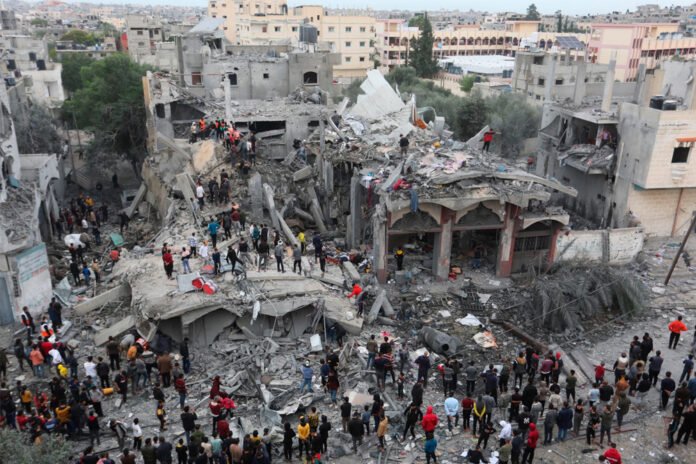The liberal theory in International Relations considers peace to be the sine-qua-non of the present world order. It emphasises peace as a prerequisite for promoting a rules-based international political order. However, such a theoretical proposition appears, at best, a luxury in the bloodied battlefields of the Middle East, especially in the aftermath of the October 7, 2023, attacks on Israel by Hamas terrorists.
Even though a ceasefire was struck between Israel and Hamas almost a month back and some progress was achieved with the release of Israeli hostages and many Palestinian prisoners, it seems to be a sort of Panglossian event in place of the otherwise negative flow of events. In that context, it is worth pondering whether there will ever be a lasting peace between the Palestinians and Jews in the region. Will the so-called ‘two-state solution’ with East Jerusalem as the capital of the proposed independent Palestinian state ever be a reality?
While the answers to these questions are at best prescient, it is still essential to examine the current events to come to a consensus on the major issues that affect the prospects of peace in the region.
A Regressive Decision
Hamas, responsible for the present state of chaos surrounding one of the most catastrophic events in the 21st century, has undermined the fragile nature of the peace that was established after much deliberation and negotiations between the mediators of Qatar, Egypt, the US and Israel in deciding to pause ‘indefinitely’ the release of Israeli hostages.
What compounds the matter further is the poor condition of three female hostages who were released in the last round of negotiations, sparking allegations of torture and sexual assault.
Hamas has undermined the fragile peace established after much deliberation and negotiations between the mediators of Qatar, Egypt, the United States and Israel in deciding to pause ‘indefinitely’ the release of Israeli hostages
The Israeli government has set the military on high alert, expecting a fresh round of armed confrontation between the two belligerents. The US under President Donald Trump has made it very clear that if all the hostages are not released expeditiously then ‘all hell will break loose’.
Hamas’ allegation that Israel didn’t honour the ceasefire agreement appears to be motivated more by keeping the pot of conflict boiling rather than seeking a negotiated end to the conflict that has claimed tens of thousands of lives. Hamas, which has been in power in the Gaza Strip since 2007, has never really been concerned with the rights and liberties of the Palestinians. Strong evidence of Hamas using innocent Palestinians as human shields during Israeli military operations during the war has been highlighted in the global press.
The stated objective of Hamas – From Land to the Sea, Palestine will be free – highlights, in no uncertain terms, the cherished goal of Hamas to do whatever it takes to achieve it. Hence, it would be difficult to dismiss the possibility of Hamas not eliminating the hostages under their stated ideology but rather using them as a politically motivated bargaining chip.
Israel has put the military on high alert, expecting a fresh round of armed confrontation between the two belligerents. US President Donald Trump has made it clear that if all the hostages are not released expeditiously then ‘all hell will break loose’
Need for others to step in
Given the highly delicate state of affairs, the region’s countries must step in to resolve the dispute. So far, only Egypt and Qatar have been doing the lion’s share of negotiations as well as spending resources to support the Palestinians’ basic needs. Other countries in the Middle East need to contribute to resolving this seemingly intractable conflict. Saudi Arabia, the de facto leader of the Islamic world, must take the lead in resolving this conflict. The Saudis carry massive religious and political heft when it comes to geopolitical as well as issues of faith.
In that context, Saudi Arabia must sit down with other important stakeholders in the conflict and engage in shuttle diplomacy, not only to put a permanent end to this war but also to resolve the concerns of human rights of both the Palestinians and Israelis.
The need of the hour is a new social amity between the Palestinians and Israelis in general and Jews and Muslims of the region in particular. Such a proposed social contract shall cover the human rights, liberties and duties of both sides
The need of the hour is a new social amity between the Palestinians and Israelis in general and Jews and Muslims of the region in particular. Such a proposed social contract shall cover human rights, liberties and duties of both sides. Under the aegis of the regional negotiators (led by Saudi Arabia) and institutionalised by the participation of the United Nations, both sides should address the territorial and livelihood issues of the Palestinians in exchange for security and the right of existence of Israel.
Regarding the contentious territorial issue, the United Nations must be given overriding power to decide on matters for both sides.
If both sides want peace and security in the region, they must try and build a consensus on the absolute need for peace and a new social compact that will alter the course of the history of the Middle East.
–The writer is currently working as a Research Associate at Defence Research and Studies (dras.in) and is a columnist. The views expressed are personal and do not necessarily reflect the views of Raksha Anirveda






